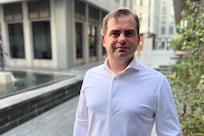BEIRUT // Syria's embattled president said on Monday that "saboteurs" are trying to exploit legitimate demands for reform, as the regime faces its most powerful challenge in more than four decades.
President Bashar Al Assad's televised address was only his third public speech since the country's uprising began in March, inspired by the revolutions in Tunisia and Egypt.
"What is happening today has nothing to do with reform, it has to do with vandalism," Mr Al Assad told a crowd of supporters at Damascus University. "There can be no development without stability, and no reform through vandalism. ... We have to isolate the saboteurs."
His message is not new: since the uprising broke out, the Syrian government has claimed the unrest is being driven by armed thugs and a foreign conspiracy, not true reform seekers.
The opposition estimates more than 1,400 Syrians have been killed and 10,000 detained as Mr Al Assad's forces try to crush the protest movement. The deadly crackdown has only galvanised protesters, who now insist they will accept nothing less than the regime's downfall.
Nearly 11,000 people have fled into neighbouring Turkey in an embarrassing spectacle for one of the most tightly controlled countries in the Middle East.
Mr Al Assad, who inherited power in 2000 after his father's death, has made a series of overtures to try to ease the growing outrage, but protesters have dismissed them as either symbolic or coming far too late.
Mr Al Assad lifted the decades-old emergency laws that give the regime a free hand to arrest people without charge and granted Syrian nationality to thousands of Kurds, a long-ostracized minority.
International pressure on the regime has been mounting steadily. Britain's foreign secretary, William Hague, on Monday said Syria's leader must reform or go. Mr Hague also said he hopes Turkey will play an influential role.
"I hope our Turkish colleagues will bring every possible pressure to bear on the Assad regime with a very clear message that they are losing legitimacy and that Assad should reform or step aside," Mr Hague said as he arrived in Luxembourg for a meeting of EU foreign ministers.
They are expected to discuss expanding sanctions on Syria, where the government is cracking down brutally on dissent.
On Monday, the government tried to back up its claim that criminals were behind the unrest by taking journalists and foreign diplomats on a trip to a northern town where authorities say armed groups killed 120 security personnel two weeks ago.
The trip to Jisr al Shughour in the Idlib province near the border with Turkey was organised jointly by the Syrian foreign ministry and the military. It included 70 Western and Arab diplomats, including the US ambassador Robert Ford.
Major Gen Riad Haddad, head of the Syrian military's political department, told journalists on the trip that the military will continue to pursue gunmen "in every village where they are found, even near the Turkish border".
In addition to the refugees in Turkey, some 5,000 people who fled their homes are camped out on the Syrian side of the border and face dwindling resources.






